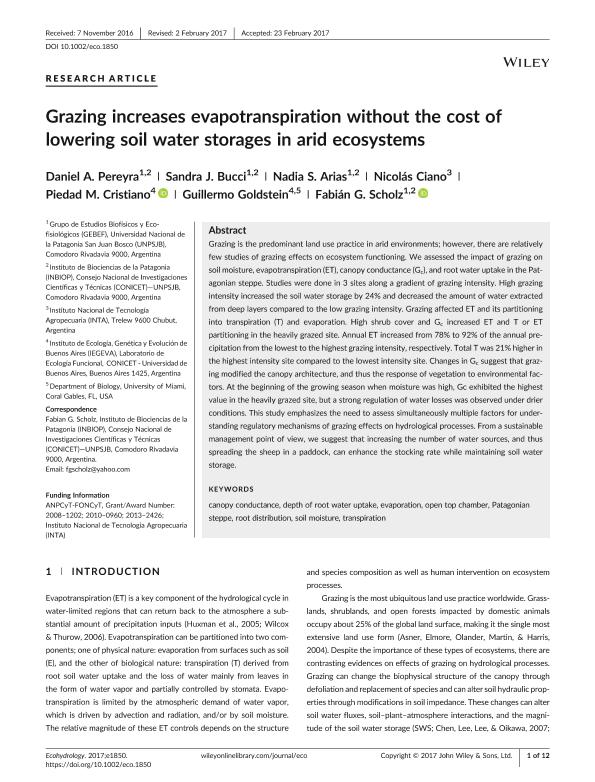Artículo
Grazing increases evapotranspiration without the cost of lowering soil water storages in arid ecosystems
Pereyra, Daniel A.; Bucci, Sandra Janet ; Arias, Nadia Soledad
; Arias, Nadia Soledad ; Ciano, Nicolás; Cristiano, Piedad María
; Ciano, Nicolás; Cristiano, Piedad María ; Goldstein, Guillermo Hernan
; Goldstein, Guillermo Hernan ; Scholz, Fabian Gustavo
; Scholz, Fabian Gustavo
 ; Arias, Nadia Soledad
; Arias, Nadia Soledad ; Ciano, Nicolás; Cristiano, Piedad María
; Ciano, Nicolás; Cristiano, Piedad María ; Goldstein, Guillermo Hernan
; Goldstein, Guillermo Hernan ; Scholz, Fabian Gustavo
; Scholz, Fabian Gustavo
Fecha de publicación:
09/2017
Editorial:
John Wiley & Sons Inc
Revista:
Ecohydrology
ISSN:
1936-0584
Idioma:
Inglés
Tipo de recurso:
Artículo publicado
Clasificación temática:
Resumen
Grazing is the predominant land use practice in arid environments; however, there are relatively few studies of grazing effects on ecosystem functioning. We assessed the impact of grazing on soil moisture, evapotranspiration (ET), canopy conductance (Gc), and root water uptake in the Patagonian steppe. Studies were done in 3 sites along a gradient of grazing intensity. High grazing intensity increased the soil water storage by 24% and decreased the amount of water extracted from deep layers compared to the low grazing intensity. Grazing affected ET and its partitioning into transpiration (T) and evaporation. High shrub cover and Gc increased ET and T or ET partitioning in the heavily grazed site. Annual ET increased from 78% to 92% of the annual precipitation from the lowest to the highest grazing intensity, respectively. Total T was 21% higher in the highest intensity site compared to the lowest intensity site. Changes in Gc suggest that grazing modified the canopy architecture, and thus the response of vegetation to environmental factors. At the beginning of the growing season when moisture was high, Gc exhibited the highest value in the heavily grazed site, but a strong regulation of water losses was observed under drier conditions. This study emphasizes the need to assess simultaneously multiple factors for understanding regulatory mechanisms of grazing effects on hydrological processes. From a sustainable management point of view, we suggest that increasing the number of water sources, and thus spreading the sheep in a paddock, can enhance the stocking rate while maintaining soil water storage.
Archivos asociados
Licencia
Identificadores
Colecciones
Articulos(IEGEBA)
Articulos de INSTITUTO DE ECOLOGIA, GENETICA Y EVOLUCION DE BS. AS
Articulos de INSTITUTO DE ECOLOGIA, GENETICA Y EVOLUCION DE BS. AS
Articulos(INBIOP)
Articulos de INSTITUTO DE BIOCIENCIAS DE LA PATAGONIA
Articulos de INSTITUTO DE BIOCIENCIAS DE LA PATAGONIA
Citación
Pereyra, Daniel A.; Bucci, Sandra Janet; Arias, Nadia Soledad; Ciano, Nicolás; Cristiano, Piedad María; et al.; Grazing increases evapotranspiration without the cost of lowering soil water storages in arid ecosystems; John Wiley & Sons Inc; Ecohydrology; 10; 6; 9-2017; 1-12; e1850
Compartir
Altmétricas



